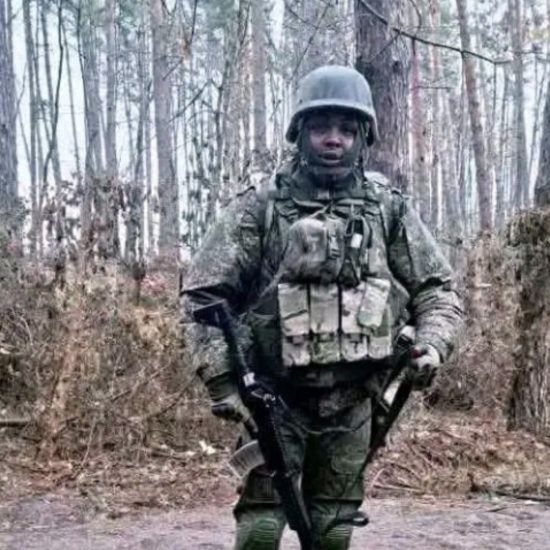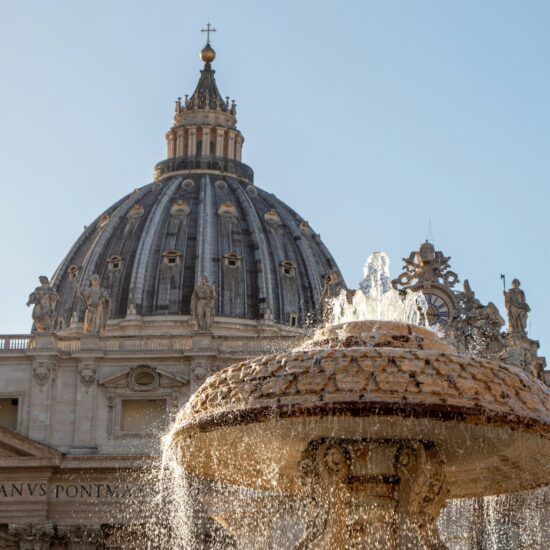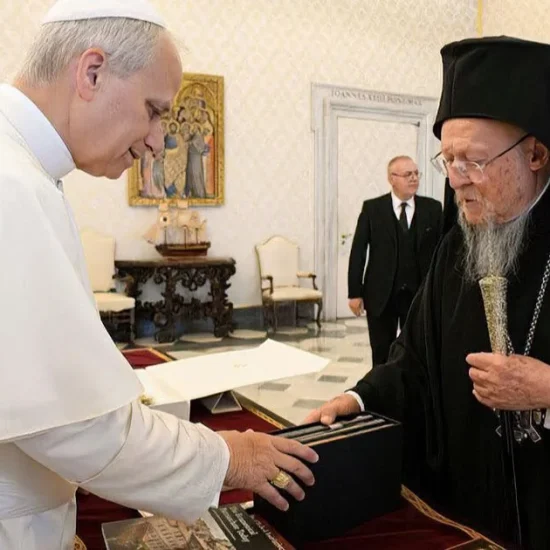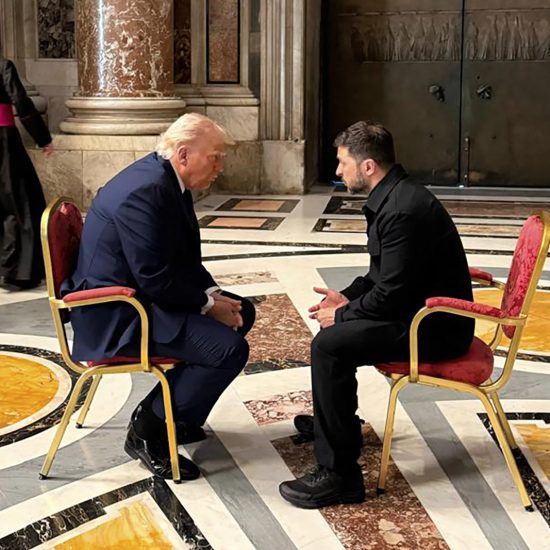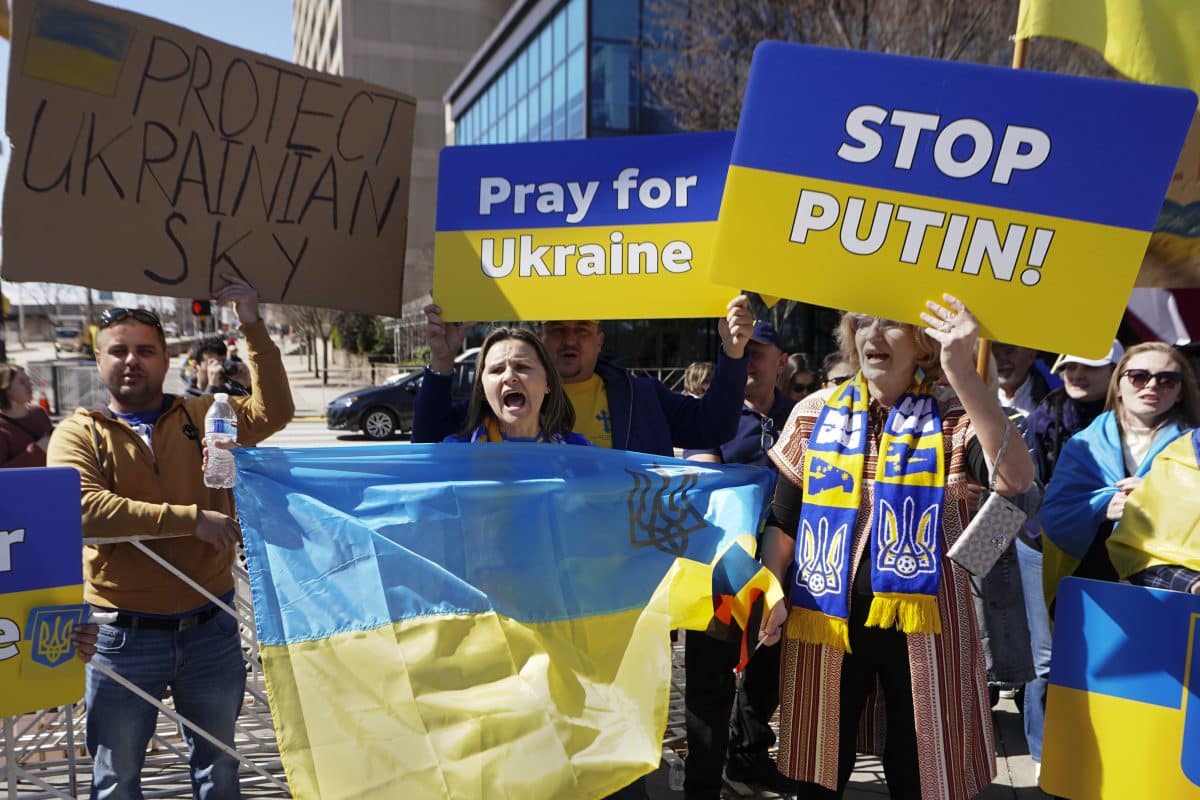
On Friday (Feb. 25), Ukraine’s ambassador to the United Nations, Sergiy Kyslytsya, addressed an emergency meeting of the U.N.’s Security Council. He called for “a moment of complete silence to pray — or to meditate if you do not believe in God — for peace.” He requested diplomats join him to “pray for souls of those who have been already killed, for souls of those who may be killed.”
Then Kyslytsya added: “And I invite the Russian ambassador to pray for salvation.”
That’s the spiritual equivalent of a mic drop. Clearly feeling burned, the Russian ambassador interjected a complaint. But after the moment of silence, the rest of the diplomats erupted with applause. We’re nerdy enough to have watched plenty of U.N. meetings to know they don’t regularly include prayer times or especially spontaneous applause for prayer (though to be fair, quiet prayer time is not always so popular even in church services).
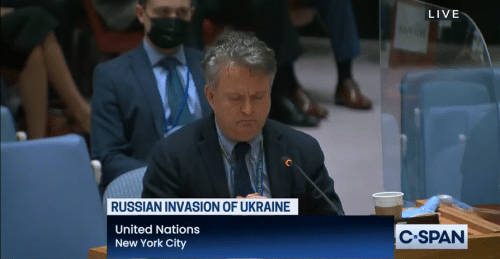
Screengrab as Ukraine’s ambassador to the United Nations, Sergiy Kyslytsya, pauses for quiet prayer during a U.N. Security Council meeting on Feb. 25, 2022.
Two days earlier, while sitting in a U.N. meeting as news broke of Russia’s invasion, Kyslytsya urged his Russian counterpart, Vasily Nebenzya, to call Russian President Vladimir Putin to stop the attack. Kyslytsya added, “There is no purgatory for war criminals; they go straight to hell, ambassador.”
It might be tempting to view the remarks of Kyslytsya as just a less profane and more, well, diplomatic version of the Ukrainian soldiers who told their attackers, “Russian warship, go f*** yourself!” But we think there’s something more profound in the Ukrainian ambassador’s prayer request. Generic petitions for peace ring hollow if the oppressor who’s preventing peace joins hands for the moment without repentance or consequences.
There have understandably been lots of calls for prayer over the past week since Russia invaded Ukraine. But not all of them speak clearly about why we must pray for such peace. As we saw during the U.N. Security Council meeting, public prayer in a time of war requires more than just requesting peace.
In this issue of A Public Witness, we listen to numerous calls for prayer from Christian leaders, denominations, and parachurch organizations. And we meditate on what it means to prophetically pray for peace instead of uttering generic calls that coddle the ones who broke the peace.
Why Are We Praying?
“Those who wage war forget humanity,” Pope Francis preached on Sunday to the faithful gathered in St. Peter’s Square. He told the audience that his “heart is broken” as he urged the global community to fast and pray for Ukraine on Ash Wednesday.
Despite these laments, the pope noticeably did not denounce Russia or Vladimir Putin by name (and the USCCB followed his lead). Francis has devoted part of his papacy to establishing ties with the Russian Orthodox Church. Before a historic meeting in 2016, the spiritual leaders of the two communions hadn’t talked since their predecessors excommunicated each other in 1054 (which might be the world record for longest silent treatment).
Russia’s aggression in Ukraine puts the pontiff in an awkward situation. An open and honest critique threatens to undermine progress in ecumenical relations, while also reducing his ability to serve as a diplomatic mediator (a role Pope Francis is known to play). To be fair, the pope did take the unusual step of personally visiting the Russian Embassy to the Holy See so he could, as his spokesperson explained, “express his concern about the war.”
While Pope Francis showing up unannounced at the embassy was symbolically powerful (and presumably gave the person staffing the reception desk a story to tell the grandkids), his public words on the war gloss over the sins of the aggressor.
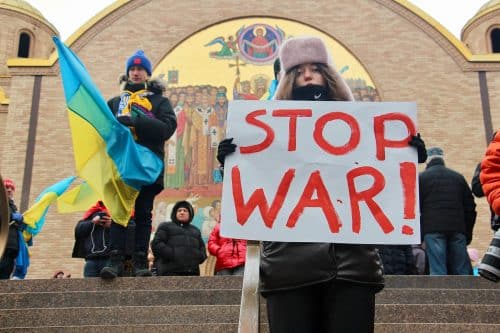
Inna Zotikova holds a sign during a rally outside the Sts. Volodymyr and Olha Ukrainian Catholic Church in Chicago’s Ukrainian Village neighborhood on Feb. 24, 2022. (Emily McFarlan Miller/Religion News Service)
A similar problem exists with a plea for prayer released by mainline Christian and interfaith leaders on Thursday. The statement issued after the Russian attack on Ukraine referenced “tensions between Ukraine and Russia” and asked “all parties” to “de-escalate this threat to international peace and security.” Then the signers noted they “call all those involved — whether governments, movements, or individuals — to repent of aggression and violence, and turn instead to the way of peace through dialogue.”
While the statement mentioned “we cannot remain indifferent to the injustice this conflict has brought on the people of Ukraine” and urges prayer “for wisdom, peace, and justice to prevail in Ukraine,” it failed to assign moral responsibility to Putin or the Russian government/military. The ambiguous language of “all parties” and “all those involved” risks the interpretation that Ukraine holds culpability for what has transpired instead of clearly articulating that de-escalating the conflict and establishing peace requires Russia to stop its attack.
Concerned about this language, we reached out to Kathryn Lohre, the ELCA’s executive for ecumenical and inter-religious relations and theological discernment. But her comments repeated the pattern of emphasizing the crisis in Ukraine while avoiding any blame for its creation (and unfortunately referred to Ukraine as “the Ukraine”).
“The statement reflects the concerns we share for all people — civilians — living in both the Ukraine and in Russia. In our call to prayer, the focus is intentionally on those who are experiencing the impact of political decisions,” Lohre told us. “As is clear, the call for prayer is unequivocal in its call for peace and justice in Ukraine. As religious leaders, our focus on the people extends to our common concern for what this means in light of the already-dire humanitarian crises within Ukraine and beyond as people are forced to flee the violence.”
Similarly, a United Church of Christ call for “prayer for Ukraine” on Thursday failed to differentiate between the aggressor and the oppressed. The UCC leaders said they “pray for an end to the deep insecurity and mistrust on all sides” and asked “God to grant wisdom to the leaders of the nations.” Ironically, the UCC’s prayer call started with a sharp Bible verse about the Lord hating those who shed innocent blood and added in the prayer: “Give us the courage and the strength to cry aloud against wickedness in high places that dare to harm others made in your image.” Yet, the UCC’s prayer failed to live up to that courage.
These religious leaders, especially Pope Francis, navigate complex ecumenical relationships and face difficult pressures in forging unity among a diverse coalition of signers. But that shouldn’t excuse their calls for peace for failing to name the clear perpetrator of the violence. Such oversight renders these prayers incomplete and the witness insufficient.
Help sustain the ministry of Word&Way by subscribing to A Public Witness!
Truth During the Fog of War
On Thursday, the European Baptist Federation issued a call to “pray unceasingly for the people of Ukraine and cry out for God’s protection and justice for the vulnerable.” The group includes in its membership both the All-Ukrainian Union of Associations of Evangelical Christians-Baptists and the Union of Evangelical Christians-Baptists of Russia. This brings together the more than 2,300 Ukrainian Baptist churches and the more than 1,600 Russian Baptist congregations along with those from other countries across the region.
But EBF didn’t mince words about why they needed to pray for peace. Their call for “prayer and solidarity with Ukraine” started by noting that EBF “laments and denounces the Russian attacks on Ukraine.”
Of course, Russian Baptists have also been frequently persecuted by Putin’s regime, so such criticism of the Russian government is unlikely to cause a rift among Baptists. After all, the EBF previously passed a resolution in 2017 criticizing the use of “anti-terror legislation” to discriminate against people for their religious beliefs — which is what Putin did in signing a law the previous year that quickly sparked persecution of Baptists, Pentecostals, Jehovah’s Witnesses, and others. And in 2018, EBF passed another resolution — while meeting in Lviv, Ukraine — denouncing how the Russian-backed separatists were violating religious freedom rights in the occupied parts of eastern Ukraine.
EBF hasn’t been alone among religious bodies with Russian members to clearly denounce Russia’s attack on Ukraine. Perhaps most significantly, the World Council of Churches on Thursday criticized Putin for “this fratricidal war” akin to “Cain’s murder of Abel.” The missive also directly urged Putin to “stop the war.” Among the 352 member denominational bodies in the WCC is none other than the Russian Orthodox Church, whose long support for Putin likely makes for an awkward dynamic.
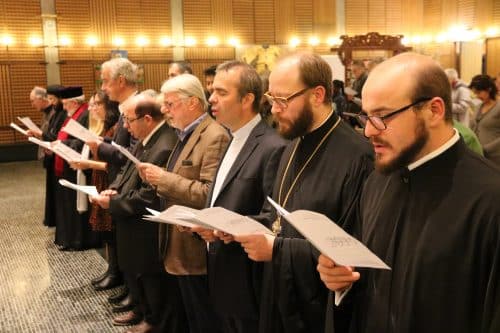
Christian leaders from various traditions gather for a World Council of Churches event to pray for Christian unity on Jan. 23, 2019, in Geneva, Switzerland. (Xanthi Morfi/WCC)
Other groups have also clearly named the disturber of peace while encouraging prayers for peace:
- The World Evangelical Alliance urged “prayers for peace” while also “condemning the violation of international law by Russia.” The statement added that Putin’s “disaster” from his “unjustified and unprovoked” attack are based on “untrue” claims.
- A call to “pray for Ukraine” from the National Association of Evangelicals included among its requests: “Pray that God would change the head, heart, and plans of President Vladimir Putin.” While the statement urged prayers for those “on both sides who are conscripted or forced to fight,” it clearly noted which leader had started this war that was killing and displacing people.
- Sojourners issued a call for peace that also noted the group “unequivocally condemns the Russian government’s unjustified attacks on its neighbor Ukraine.” Sojourners President Adam Taylor added, “We call for the de-escalation of violence, as our faith in the Prince of Peace and his teaching ‘blessed are the peacemakers’ compel us to assert that war and violence are never the answer, even as we recognize that Putin must be held accountable for his aggression through non-military means.”
- The Franciscan Action Network offered a “call for prayer, fasting, and other efforts to end this conflict.” The Catholic group offered concern for the “untold human suffering” that would come to people in Ukraine as well as “dangerous consequences” for people in Russia and elsewhere. But they didn’t allow that concern for Russian people to silence a clear critique of the “illegal invasion” and “unprovoked military aggression from Russia.”
- The Friends Committee on National Legislation, a Quaker lobbying group, said they “stand in solidarity and sympathy with all the people of Ukraine who have suffered egregious assaults on their lives, freedoms, and human dignity.” FCNL also noted they “stand with the people of Russia and all those in the region whose lives will be torn apart by war.” But this wasn’t both-sidism. While caring for people in both nations who will suffer from Putin’s war, the FCNL clearly condemned those responsible for the violence. The statement by FCNL General Secretary Bridget Moix specifically called on Putin “to immediately withdraw all Russian military forces from all areas of Ukraine.”
- The National Council of Churches USA issued a “call for peace and an end to Russian aggression and acts of war in … Ukraine.” While offering prayers for Ukraine amid “this senseless war levied against them by Russia,” the NCC also said they “stand with the Ukrainian people” and “stand in solidarity with those protesting in Russia to try to get their government to choose a different, peaceable course of action.”
As these examples show, many religious leaders offering calls for peace and prayer found it necessary to simultaneously offer explicit condemnations of Putin’s war. We think that should be viewed as a natural part of calls for peace.
Get cutting-edge analysis and commentary like this in your inbox every week by subscribing today!
Peace Be With You
Shortly after the Russian attack on Ukraine, Patriarch Kirill, the head of the Russian Orthodox Church, urged “fervent prayer for the speedy restoration of peace.” A Religion News Service article on Thursday highlighting various calls for prayer included Kirill’s remarks about how he empathized with those “touched by misfortune” and urged the avoidance of civilian casualties.
But since Kirill is closely aligned with Putin and has supported the Russian government, we were skeptical of Kirill’s words. Believing Kirill didn’t speak in good faith, we didn’t think his statement fit with the sincere calls for peace found throughout that article. So, we cut that section from the RNS piece when we reposted it at wordandway.org. Our skepticism proved accurate on Sunday.
“God forbid that the current political situation in brotherly Ukraine should be aimed at ensuring that the evil forces that have always fought against the unity of Russia and the Russian Church prevail,” Kirill told parishioners. “We must do everything to preserve peace between our peoples and at the same time protect our common historical fatherland from all external actions that can destroy this unity.”
When one believes that the Ukrainian government is “evil,” then a hope for peace is one that comes from Russian victory not withdrawal. When one believes Ukraine is fighting against your church, then the holy mission for justice is one that sees a righteous crusade against that nation. This worldview of a “Holy Russia” is shared by Putin himself. Kirill and Putin both want “peace and justice” in Ukraine but on their terms.
That’s why Christians around the world must be specific and direct in their prayers. Our pleas to God must call out those who disrupt the peace, commit injustices, and destroy innocent lives. Oppressors cannot go unmentioned. As Jim Wallis told us, “Christians must name Vladimir Putin and his military aggression as evil.”
“This is [Putin’s] war and he must be condemned by every church, every country, and every leader around the world,” added Wallis, the director of the Center on Faith & Justice and a professor at Georgetown University. “Christians who know that war is not the answer must act in the strongest ways possible for complete and crippling sanctions of Russia, with a personal focus on Putin and his cronies by offering support to the civil resistance in Ukraine, those protesting war in Russia, and speaking out around the world; and by calling out the moral cowardice of Republican leaders who refuse to denounce Donald Trump’s praise of Putin.”
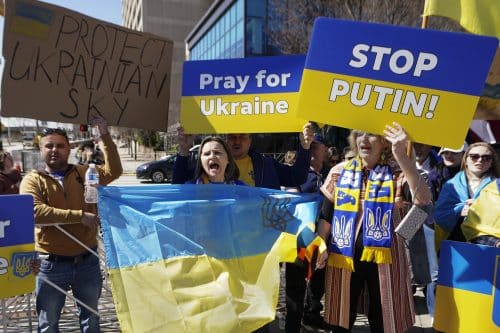
Demonstrators holds signs and Ukrainian flags during a rally to show support for Ukraine on Feb. 26, 2022, in Atlanta, Georgia. (John Bazemore/Associated Press)
This is a moment where it’s obvious what a prophetic witness requires. There is real evil in the world that needs to be condemned. Praying for victims of war isn’t the same as for victims of a natural disaster. The former demands we not just pray for healing of the hurting but also repentance from the oppressors.
David Gushee, an ethicist at Mercer University and author of the brand-new book Introducing Christian Ethics (and a Word&Way board member), told us that “pray for peace in Ukraine” is “a good message, and a good thing to do. But concreteness matters in Christian ethics, as does calling things by their right name.” So, he offered an example of “what I think Christian leaders should be saying” in this moment: “Pray for Russia’s unjust and murderous invasion of Ukraine to fail, as soon as possible, for the sake of Ukraine, and for the sake of peace and justice in the world. Meanwhile, pray for those whose lives are being threatened and disrupted by this invasion. May they be comforted, and may a just peace soon be restored.”
Amen! We don’t want to be like those the prophet Jeremiah denounced for saying “peace, peace” when there is no peace. Similarly, we don’t want to pray “peace, peace” while not lifting our voices against those preventing peace. We cannot just pray for Ukraine. We must also name the sins of Russia and Putin for what they are. In a moment like this, we must not choose silence.
As Holocaust survivor Elie Wiesel said in his 1986 Nobel Peace Prize acceptance address: “We must take sides. Neutrality helps the oppressor, never the victim. Silence encourages the tormentor, never the tormented.”
As a public witness,
Brian Kaylor & Beau Underwood

